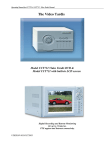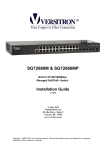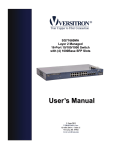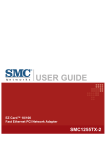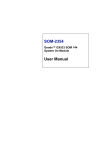Download Versitron N7013x Series Installation guide
Transcript
N7013x Series 100BASE-FX Fiber Optic Network Interface Card Installation Guide Copyright January 2005 VERSITRON, Inc. 83 Albe Drive / Suite C Newark, DE 19702 www.versitron.com 1 Oct2005 N7013x Man The information contained in this document is subject to change without prior notice. Copyright (C) All Rights Reserved. TRADEMARKS All brand names are trademarks or registered trademarks of their respective holders. Warning This equipment has been tested and found to comply with the limits for Class B digital device, pursuant to Part 15 of the FCC Rules. These limits are designed to provide reasonable protection against harmful interference when the equipment is operated in a residential installation. This equipment generates, uses, and can radiate radio frequency energy and if not installed and used in accordance with the instruction manual may cause harmful interference to radio communications. However, there is no guarantee that interference will not occur in a particular installation. If this equipment does cause harmful interference to radio or television reception, which can be determined by turning the equipment off and on, the user is encouraged to try to correct the interference by one or more of the following measures: • • • Reorient or relocate the receiving antenna. Increase the separation between the equipment and receiver. Connect the equipment into an outlet on a circuit different from that to which the receiver is connected. Consult the dealer or an experienced radio TV technician for help. Notice: The changes or modifications not expressly approved by the party responsible for compliance could void the user authority to operate the equipment. 2 CISPR 22 Class B This device complies with EMC directive of the European Community and meets or exceeds the following technical standard: EN 55022 Limits and Methods of Measurement of Radio Interference Characteristics of Information Technology Equipment. This device complies with CISPR 22 Class B. CE NOTICE Marking by the symbol indicates compliance of this equipment to the EMC directive of the European Community. Such marking is indicative that this equipment meets or exceeds the following technical standards: EN55022/CISPR 22 ClassB EN55024 - EN61000-3-2, EN61000-3-3, EN61000-4 series 3 Table of Contents 1. Introduction ........................................... 5 1.1 Adapter Features ......................................... 5 1.2 Specifications .............................................. 6 1.3 Model Definitions ......................................... 6 1.4 Board Components ..................................... 7 1.5 Wake On LAN Technology ........................... 8 2. Installing the Adapter ......................... 11 2.1 Installing the Adapter .................................. 11 2.2 Configuring Wake-On-LAN ........................ 12 2.3 Connecting to the Network ........................ 13 3. Network Driver Installation ................ 15 3.1 Driver Information ...................................... 15 3.2 BIOS Setup ............................................... 15 3.3 Installation for Windows Systems ............. 16 3.4 Installation for other Systems .................... 17 4. LED Indicators .................................... 18 4.1 Interpretations ............................................ 18 Appendix ................................................. 19 A.1 Installing Remote Boot ROM ..................... 19 4 1. Introduction The 100BASE-FX Fast Ethernet PCI Adapter is a 32-bit LAN adapter for use in personal computers with PCI computer bus slots. It also features Wake on LAN function for ACPI-compliant system. This adapter features fiber connectors for a 100 Mbps IEEE 802.3u Ethernet network connection over optical fiber cable. The series provides different fiber transceiver types supporting short, middle, and long reach applications. 1.1 Adapter Features - PCI revision 2.1 and 2.2 compliance - 32-bit PCI half-card supports standard PCI or low-profile PCI - Supports 100BASE-FX fiber connection - Complies with IEEE 802.3u 100BASE-FX standard - Supports short, middle, and long reach fiber applications - Supports diversified fiber connectors - Far End Fault support on the 100BASE-FX port - Comprehensive LED indications - Wake-On-LAN (WOL) function for ACPI-compliant systems - Supports plug-and-play installation for Windows ME/2000/2003/XP systems - Supports network drivers for most popular operating systems - Optional PXE/RPL Boot ROM for network operating systems 5 1.2 Specifications Network port std.: PCI slot: ACPI std.: PCI Power Management: Operating temperature: Operating humidity: IEEE 802.3u 100BASE-FX PCI 2.2 Rev.1.1 Rev.1.1 0o to 40oC 10% to 90% non-condensing 1.3 Model Definitions Model FX-MT FX-MC FX-JM FX-VM FX-L FX-SA2 FX-SL2A FX-SL2 FX-SL4 FX-SL6 FX-SL9 FX-SL10 FX/LP-MT FX/LP-MC FX/LP-JM FX/LP-VM FX/LP-L FX/LP-SA2 FX/LP-SL2A FX/LP-SL2 FX/LP-SL4 FX/LP-SL6 FX/LP-SL9 FX/LP-SL10 PCI Standard Standard Standard Standard Standard Standard Standard Standard Standard Standard Standard Standard Low profile Low profile Low profile Low profile Low profile Low profile Low profile Low profile Low profile Low profile Low profile Low profile Connector ST SC MT-RJ VF-45 LC SC SC SC SC SC SC SC ST SC MT-RJ VF-45 LC SC SC SC SC SC SC SC 6 Fiber Cables MMF up to 2km MMF up to 2km MMF up to 2km MMF up to 2km MMF up to 2km SMF up to 20km SMF up to 20km SMF up to 30km SMF up to 50km SMF up to 70km SMF up to 90km SMF up to 100km MMF up to 2km MMF up to 2km MMF up to 2km MMF up to 2km MMF up to 2km SMF up to 20km SMF up to 20km SMF up to 30km SMF up to 50km SMF up to 70km SMF up to 90km SMF up to 100km 1.4 Board Components Figure 1-1 shows the major components on the adapter. The following table describes these components. No. Components Description 1 fiber connectors The connectors require fiber cable for 100 Mbps connection. 2 Link LED This LED lights when the connection is established. 3 Act. LED This LED lights when network data is transmitted or received. 4 FDX LED This LED indicates full duplex operation is in process. 5 U3 Remote boot ROM socket 6 JP1 3-Pin Wake on LAN (WOL) connector Figure 1-1 7 1.5 Wake On LAN Technology The adapter is an ACPI-compliant network adapter that supports the following features: - Power management interface - Remote wake-up (RWU) ACPI (Advanced Configuration and Power Management Interface) ACPI is a key element in Operating System Directed Power Management. It is a specification developed by Intel, Microsoft, and Toshiba Corp which allows more advanced power management features through the operating system to the hardware interfaces. Remote Wake-up (RWU) The Remote Wake-up feature is provided by Wake on LAN (WOL) technology that resides in a network adapter and on the system motherboard in a LAN environment. When a system is in a standby or suspend state, the network adapter continuously monitors the network and watches for a wake-up packet. When it receives that packets, it alerts the system, which then comes to a full power state and stands ready for maintenance or other tasks. 8 Wake-up Methods The adapter supports the following wake-up methods: - Magic packet wake-up The adapter can accept magic packets from network and walkup the computer at standby state or shutdown state. - Link change wake-up The adapter can sense link up event and walk-up the computer from standby state. - Ping packet The adapter can accept a ping packet and walk-up the Windows computer from standby state. Wake-On-LAN (WOL) Installation The adapter features : 1. One LAN controller which can support PCI power management interface and function. 2. One 3-Pin Wake on LAN (WOL) connector (JP1) for PCI 2.1 system 3. One Wake on LAN (WOL) cable for PCI 2.1 system For PCI 2.1 Systems (or earlier 2.0 systems) The 3-pin WOL connector (JP1) provides an interface to the PCI 2.1 compliant system motherboard for auxiliary power and Power Management Enable signal through the WOL cable. One 3-pin WOL connector must be also provided on the motherboard. To install the cable, refer to section 2.2 for the details. 9 For PCI 2.2 Systems JP1 WOL connector and WOL cable are not required. WOL feature is accomplished through PCI 2.2 bus interface. To support remote wake-up, the system motherboard must be featured with RWU or WOL support in hardware and BIOS. Refer to your system motherboard manual to determine if it is remote wakeup capable. Enable Adapter's Wake-On-LAN Function The Wake-On-LAN function of the adapter is enabled with factory default setting. RSET8139 program provided in the supplied driver diskette can be used to check and set Wake-On-LAN configuration of the adapter. Operating System Setup In addition to the RWU-capable motherboard, an ACPI supported operating system, such as Windows XP/ 2000/ ME/ 95/ 98 is also required to achieve RWU functionality. 10 2. Installing the Adapter This chapter describes how to install the Fast Ethernet PCI adapter in a PCI computer and how to connect the adapter to the network. Before installing the adapter, you need the following: - A computer system that is compliant with the PCI specifications version 2.1 or later. - An available PCI bus master slot in the computer - A Wake on LAN cable (supplied with the adapter) - The adapter driver diskettes (or CD supplied with the adapter) - Fiber cables 2.1 Installing the Adapter To install the adapter in your computer, follow these steps: 1. Turn off the power to the computer and disconnect all cables connected to the computer. 2. Remove the computer's cover. 3. Unscrew and remove the slot cover from the PCI bus slot that you plan to use. 4. Install optional Boot ROM, if you want to use the remote boot ROM function. Refer to Appendix for more information. 5. Insert the adapter into the slot and secure the screw. 6. Configure WOL, if required. Refer to 2.2 for the details. 7. Replace the computer cover and reconnect all previously connected cables. 11 Inserting the Adapter into the PCI Slot 2.2 Configuring Wake-On-LAN If your system is a PCI 2.2 complaint system, no extra installation for WOL is required. The WOL interface is accomplished through the PCI bus interface directly. If your system is a PCI 2.1 complaint system, follow these steps: 1. Make sure your system motherboard is RWU capable. 2. Make sure WOL function is enabled in the system BIOS. 3. Locate the 3-Pin WOL connector on the system motherboard. 4. Plug one end of the WOL cable to the 3-Pin WOL connector of the adapter. 5. Plug the other end of the WOL cable to the 3-Pin WOL connector on the system motherboard. 12 Installing WOL Cable Note: The adapter provides PME signal with high active level. Make sure PME setting in BIOS options is properly set if it is available. 2.3 Connecting to the Network The rear bracket of the Fast Ethernet adapter contains two fiber connectors. The connector labeled "TX" is used for transmission and the other one labeled "RX" is used for reception. Network Connectors 13 When connecting to a 100BASE-FX device using fiber cable, make sure the TX connector of the adapter is connected to the RX connector of the device and RX connector is connected to the TX connector of the device. Connecting 100BASE-FX Fiber Cable In order to have a reliable communication between two ends, the speed and duplex configuration of the adapter's FX port and the device at the remote end must be same. Configure the driver of the adapter as follows: Link/Speed Setup Auto Mode 100M_Half 100BASE-FX Connection 100Mbps, Full duplex 100Mbps, Half duplex Other settings are not suggested. 14 3. Network Driver Installation After making the connection to the network, you must install the adapter network driver in order to connect the Fast Ethernet adapter to your network operating system. 3.1 Driver Information The adapter driver media contain the latest versions of the network drivers available when the adapter is shipped from the factory. A file, \README.TXT, located in the diskette's root directory contains a list of the supported driver software and the directory structures for the supported operating environments. Please refer to this file first before installing any network driver for the adapter. 3.2 BIOS Setup Before installing the driver, it is recommended to run the system BIOS setup utility to check each PCI slot that contains a Fast Ethernet PCI adapter for the following PCI settings: 1. Enable/disable the PCI slot : make sure the PCI slot is enabled for the adapter. 2. Assign an IRQ number : make sure the IRQ number does not conflict with other add-in adapters. 3. Enable the RWU or WOL function in BIOS, if it is available. In some computers, the BIOS option is called "Power Up On PCI Card". On a PCI plug-and-play system, the PCI BIOS automatically configures the adapter, so there is no user action needed. 15 3.3 Installation for Windows Systems For adapter installation on Windows XP, Windows 2000, WinME systems, the system will detect and configure the drivers for the adapter automatically with no need for extra driver setup. The adapter is detected as: WinXP Win2000 WinME Realtek RTL8139 Family PCI Fast Ethernet NIC Realtek RTL8139(A) PCI Fast Ethernet Adapter Realtek RTL8139(A) PCI Fast Ethernet Adapter Link Speed/Duplex Mode options: Auto Mode FX port becomes 100M Full Duplex 100 Half Mode FX port becomes 100M Half Duplex Note: other values are not recommended. To apply Wake-On-Lan function, set [Power Management] option of the Adapter driver Properties: [ x ] Allow this device to bring the computer out of standby. [ x ] Allow the computer to turn off this device to save power. The settings allow the adapter to wake up the computer out of standby state when receiving magic packets or Ping packets. Using the Associated Drivers in the driver diskette After driver setup, the adapter is identified as : Realtek RTL8139/810x Family Fast Ethernet NIC 16 Link Speed/Duplex Mode options : Auto Mode FX port becomes 100M Full Duplex 100 Half Mode FX port becomes 100M Half Duplex Note: other options are not recommended. To apply Wake-On-Lan function, set [Power Management] option of the Adapter driver Properties: [ x ] Allow this device to bring the computer out of standby. [ x ] Allow the computer to turn off this device to save power. More [Advanced] options of Adapter driver Properties: Link Down Power Saving (default disabled) WakeUp on Link Change (default disabled) WakeUp on ARP/PING (default enabled) The settings allow to wake up a computer out of : Standby state by magic packets, Ping packet, and link up event Shutdown state by magic packet and link up event Other settings are recommended to remain on default values. 3.4 Installation for other Systems Refer to \README.TXT first in the driver diskette for the driver installation on other operating systems. The file contains driver information for most of the popular operating systems. 17 4. LED Indicators Each Fast Ethernet adapter has three LEDs. The functions are: 4.1 Interpretations The interpretations of the LEDs are: Link LED indicates an active 100Mbps connection is established. On : Good link between the adapter and a remote device Off : No connection between adapter and a remote device Blink: Not applicable Activity LED indicates packets are being received or transmitted. Blink : Network traffic is present On : Not applicable Off : No traffic FDX LED indicates duplex mode used for the connection On : Off : Full duplex mode is used Half duplex mode is used If you experience any problems, first make sure that the appropriate driver is loaded, the proper cable is connected to the connector, and the connected device complies with 100BASE-FX standard. Then recheck the LED. 18 Appendix A.1 Installing Remote Boot ROM Before you can use the remote boot function, you have to setup the remote boot service on the file server and install the remote boot ROM onto the adapter. The remote boot ROM is optional and must be purchased separately. The adapter boot ROM supports both PXE and RPL protocols at the same time. Consult your dealer for the availability. To install the boot ROM, make sure the notch of the boot ROM is in the same direction as the notch of the socket on the adapter. The remote boot ROM socket is labeled U3 on the adapter. After installation, use RSET8139 utility program provided in the driver diskette to enable boot ROM function. To setup remote boot services in different operation systems, refer to the associated operation manual of each network operation system. 19




















